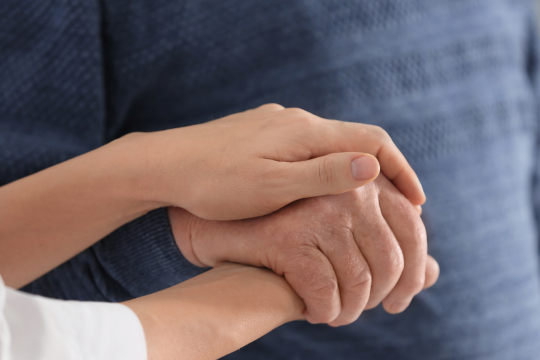
Federal Retirees member and volunteer Célyne Houde works hard to find a balance between a fulfilling retirement and her caregiving responsibilities.
Célyne Houde is the primary family member who cares for both her parents, who live in separate facilities. She’s fully committed, but she sets boundaries, to maintain her own health.
Célyne Houde can’t imagine herself providing physical care to her elderly parents — that’s just not who she is, she says. But she’s still their caregiver and she’s responsible 24/7 should they need anything. She assists them in a host of ways that best match her skills — checking in on them, helping to find prepared meals, making medical appointments and paying bills.
“I’m more of an administrative kind of person,” says the Trois-Rivières resident, who retired from the Canada Revenue Agency at the end of 2019. “My role has been putting services in place and making sure everything is fine. [It] demands a lot of time and availability, because unforeseen events are many and constant.”
She may not be a full-time caregiver, but Houde’s commitment is particularly demanding because her parents, both 93, have lived in separate retirement homes since her mother had a stroke in 2022. With her two siblings in Montreal, a two-hour drive away, she is the logical point person for both.
A few years ago, part of her efforts went into finding ways to give her father some respite from taking care of a spouse with Alzheimer’s disease. She found someone to help her mother bathe, for instance.
After her stroke, her mother couldn’t learn how to use a walkerwalker, so Houde moved her into a facility that’s better suited to her autonomy loss.
“If she falls, they’re the ones who will call the ambulance and send her to the hospital,” she says. “What I do is visit her to see if all is going well and how she’s feeling. Does she look panicked? Does she look serene?”
Every other visit or so, she takes her father with her.
“She still recognizes him, they spend a little time together,” she adds.
Houde’s father continues living autonomously, in an apartment within a residence for older adults, though he has been hospitalized several times in the recent past. She swings by every two or three days, bringing groceries and taking note of things he might need.
“I told him ‘Dad, you can no longer change your bed, it takes someone to come once a month, and do the laundry,” she recalls. “[I had] to insist. He said ‘No, I’m capable,’ but I knew he wasn’t, and he wasn’t doing it.”
There is no typical week for Houde. Some weeks she does an extra trip to do to get her father’s hearing aid repaired or his watch’s battery changed. Other times, she deals with his mail or bills. When he was hospitalized, she met with different health-care providers and implemented new measures they suggested.
One of the hard things was figuring out what services were available to her parents, whether from the government or from community groups, and what subsidies might exist. She didn’t know it was possible to have blood samples collected at home, for instance.
“Once you know these resources exist and you knock on the right doors, things start getting into place. But finding them takes work,” she admits.
While these tasks can be repetitive and make vacation planning complicated, Houde says she would feel bad not doing them. She is also aware that her father is bored on his own, and little inclined to join in social activities at the residence.
Still, she set boundaries regarding the extent of her involvement early on.
“I wouldn’t go live with my father, and it was out of the question to bring my mother here — she wouldn’t have been able to climb the stairs to go sleep,” she says.
She also keeps doing the activities she enjoys. When she has a busy week, she tells her father she has to space out her visits.
“My good years are now. If I don’t enjoy them, I may fall sick later,” she says. “My advice, at the end of the day, would be not to forget yourself.”

